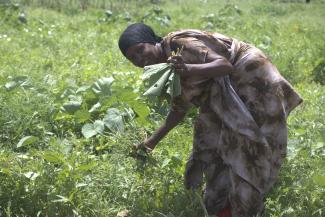In Garbatula town, located 120 kilometers East of Isiolo town in northern Kenya there is a group of entertainers that turned into farmers. The Garbatula Kinisa farmers group has 24 members.
Before, the group used to be entertainers that performed cultural songs that praised their livestock during community events. After an unprecedented drought in 2020 that led to the death of livestock, many families lost their source of livelihood.
The group then began farming, growing onions, tomatoes, carrots, bell pepper, spinach, pawpaw, and maize. They also planted different types of grass to sell to livestock farmers.
After a while, lack of water turned out to be one of their biggest challenges affecting them.
“We requested the community to let us use the water from one of the wells for farming at KES 2,736 (USD $20) per month. This elicited mixed reactions. Some community members felt we would be wasting the water, believing that no crops can grow in an arid region like ours. They often cut off the water coming to our farms. We were not deterred despite the challenges,” said Rukia Ali, one of the Garbatula Kinisa group members.


Photo credit: Mercy Mbuge/USAID
Feed the Future USAID Kenya Livestock Market System (LMS) activity saw an opportunity to partner with the group. In 2021, the group working with the Garbatula ward planning committees, submitted a grant proposal to LMS, focused on improving the ability of communities to recover from hardships.
The project installed a solar-powered system, erected a water storage tank, and installed a new piping system at the Kinisa farm. They also trained the group members on modern farming techniques. The ward planning committees serve approximately 5,000 people in 11 villages.
“The LMS project uplifted us, we harvested and sold our maize recently. We also sold a lot of onions and bell peppers. The farm is still green and ripe – we are going to harvest again. We are grateful that we are eating from the work of our hands,” said Rukia.
The farm is in stark contrast to the dry conditions around it. According to Aisha Abdi, a group member, the farm demystified the community notion that the arid region is only viable for pastoralism. “The community did not believe in us from the beginning, they thought nothing would grow in this area. But through resilience and the confidence of the LMS project in us – we have worked miracles in this region,” said Aisha Abdi. The group has also benefited from the farm being close to the market. They are able to sell fresh produce fast to their community.
With the growth of their agribusiness, they have employed two people to work at the farm. They also give the elderly and people living with disabilities farm produce to boost the nutritional value.
“Climate change is affecting the ability of our communities to sustain themselves. It is through diversification and moving to farming that we are able to adapt. I am glad that today other groups are adopting our model and have started farming," said Hussein Konsole, Chairperson of the ward planning committee.
USAID Livestock Market System is working with county governments to support the provision of clean water, sanitation, and hygiene services to communities in northern Kenya. Between January and March 2023, the project rehabilitated 12 water, sanitation, and hygiene projects increasing access to water to 2,388 households.
